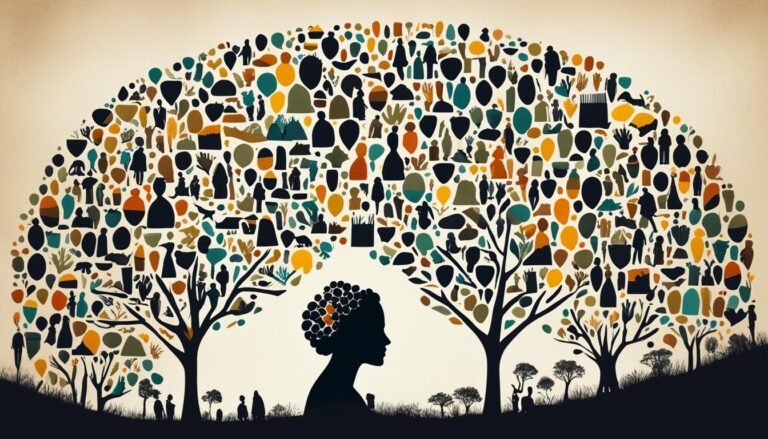How do you mentally repair yourself?
We often carry the weight of life’s emotions. Think about those times when sadness seemed too much or loneliness wouldn’t go away. It’s a struggle we’ve all shared, isn’t it? The road to better mental health is not easy. It’s complex and very personal. Keeping our minds healthy is just as crucial as caring for our bodies.
Dealing with mental health wisely is more than just talking to pros. It means knowing our inner selves. The things others tell us as we grow can really shape how we see ourselves1. Knowing this is a big first step towards healing and finding balance.
We need connections to do well. Being part of a strong social or community network can actually help us live longer2. On the other hand, being alone can make us more stressed and affect our health negatively2. Realizing the importance of these bonds is key to our emotional health.
Adding things we enjoy into our daily routines makes life better. It also helps deal with stress and other tough feelings2. This, combined with support from people we trust, lets us notice our moods and what sets them off.
Big changes often start with small steps. Setting achievable goals or practicing gratitude can make a big difference in how we feel. It’s important to stay open and kind to ourselves as we try to get better.
Key Takeaways
- Our mental health deserves the same care and attention as our physical health.
- Positive and negative messages received throughout our lives significantly impact our self-esteem1.
- Strong social and community ties drastically reduce mortality risk2.
- Engaging in activities that bring joy can counteract the emotional toll faced daily2.
- Incremental goals and gratitude practices facilitate long-term mental wellness.
Understanding Mental Health
Mental health is about how we think, feel, and behave. It’s our emotional and social well-being. This affects our daily life, like how we handle stress, connect with others, and make decisions. When we have good mental health, we can be our best self. We can deal with life’s ups and downs, work well, and help our community.
What is Mental Health?
Mental health is all about our feelings, thoughts, and social life, and how they impact our well-being. Good mental health means we can keep our body healthy, have good relationships, and reach our goals. Trying new things and learning boosts our mental health. It can make us more confident, aware of ourselves, and help us connect with others.
Why Mental Health Matters
Maintaining good mental health is important for dealing with stress and staying well. Sleeping well and staying active are key. Lack of sleep can make us moody and sad, but exercising can help by changing our brain chemistry. Friends and family give us a safe place and support. This support is vital for our mental health. Mindfulness helps us focus on the now. It makes us better at handling tough times, which keeps us emotionally well.
Self-care, setting healthy limits, and getting help when we need it are crucial to our mental health3. Putting our feelings on paper can lighten our mental load. Being kind can make us feel good and give us a sense of meaning. Eating well, getting enough sleep, and moving are also very important. They can make us feel good and lower our stress.
Self-Education and Awareness
Learning about mental health boosts our self-awareness and understanding. With different mental health resources, we start growing personally.
Resources for Learning
Learning mental health is important for growth. Informative sites like the National Alliance on Mental Illness give lots of mental health info. They help us understand conditions and treatments.
Communities and forums let us share experiences about mental health. They make us feel connected. Also, they tell us ways to handle mental health, like mindfulness and journaling.
Personal Stories and Experiences
Reading other people’s mental health stories gives us strength and practical advice. Self-awareness grows with activities like journaling, making us more mindful4.
Journaling tracks our moods and negative thoughts. It helps us see behavior influencing ideas. Plus, feedback from friends and family gives different views.
By regularly interacting with such stories, we learn to manage our mental health better4.
Emotional Healing Process
We all go through emotional healing at some point. It’s about facing tough feelings from life events like loss or illness5. Remember, healing emotions doesn’t happen quickly, and it’s okay to have setbacks5.
Acknowledging Difficult Emotions
The first step is to admit we have hard feelings. These might show up as sadness, anxiousness, or bad habits6. Once we name and understand these feelings, we can begin to deal with them. This leads to getting stronger and feeling better. Keeping a journal can really help us process our feelings5. Also, friends and family who support us are crucial during this time5.
Practicing Self-Compassion
Being kind to ourselves is key to emotional healing. Studies show that loving yourself more can improve your health and even life span5. This means treating ourselves with care, standing up for what we believe in, and not being too hard on ourselves6. Learning to be gentle with ourselves helps us heal emotionally7.
Mindfulness Techniques
Mindfulness can make a big difference in dealing with our emotions. It’s about staying in the moment, observing our thoughts but not judging them, and letting go of the past6. Practices like somatic experiencing and trauma release exercises focus on releasing feelings stored in our bodies5. Being mindful means we not only recognize our feelings but also learn to cope with tough situations5.
To wrap up, healing emotionally takes time and effort. It involves facing our deepest feelings, showing ourselves kindness, and being in the here and now. With realistic goals and the support of those we trust, we can find our way to peace and strength7.
Developing Healthy Self-Esteem
Starting your journey towards a positive self-image means focusing on your strengths. This helps fight off negative thoughts. Recognizing what makes you valuable is key.
Identifying Negative Beliefs
Many of us face self-doubts tied to our past. Studies show, abuse and neglect can hurt our self-esteem89. It’s important to realize where these negative thoughts come from.

Building Positive Relationships
Healthy self-esteem benefits greatly from good friendships. They offer support and make us feel valued. It’s noted that unhappy people often keep to themselves to avoid judgement, harming their well-being and how they see themselves8.
By building strong, supportive friendships, we create a safe space for our self-growth.
Being Assertive and Confident
Assertiveness bolsters both self-esteem and self-confidence. It’s about stating your needs clearly. Being assertive doesn’t mean being unkind. It helps find a balance between caring for ourselves and helping others810.
It’s about setting healthy boundaries and not feeling bad for putting your needs first.
Being kind to yourself, recognizing your worth, and building sustaining relationships lifts your self-esteem. It leads to a more satisfying life. This multi-faceted approach is a powerful way to grow your self-esteem and confidence.
Coping Skills and Mechanisms
It’s important to know good coping skills to handle stress and emotions. These are ways we deal with stress, like thinking positively or getting support from others. Various strategies help us cope, like focusing on solving problems or finding meaning in life11. Other methods are turning to faith, talking to friends, or looking at the bright side of things12.
Healthy coping methods can calm you down or help you stay calm during tough times12. Using good problem-solving skills, like asking for advice or setting goals, is key12. Activities such as hobbies, working out, or being mindful can also help12.
However, many people use bad ways to cope with stress13. This could be drinking too much, overeating, or avoiding issues12. Bad habits like these can lead to addiction, health problems, or wasting money13.
Good coping means reacting well to stress, like staying positive and solving problems11. It’s about staying open-minded and being ready to face challenges11. By looking at difficulties positively, we can grow stronger in the face of future problems11.
It all starts with knowing what helps us and what doesn’t in stressful times. Some ways might make us feel better for a while but hurt us in the long run. Finding and using good coping strategies can really make a difference in how we handle stress and life’s troubles.
How do you mentally repair yourself?
Dealing with trauma is a crucial start for mental healing. It’s important to spot the signs of trauma. Getting professional help through therapy or counseling offers a way to heal. By looking at and dealing with our past, we can start to understand our feelings and thoughts. This understanding paves the way to getting better.
Recognizing and Addressing Trauma
Trauma can cause many strong emotions and actions, like shock and anger. These can last from a few days to months14. Realizing these reactions are a part of trauma is the first step to getting better. Childhood trauma can really affect us, making us feel scared and helpless even as we grow14. So, it’s crucial to work through these feelings with the right kind of help.
Exercises, especially those done regularly, can help repair our nerves. This includes activities that move both our arms and legs together14. Trauma-informed therapy can also help a lot. It gives us the tools needed to deal with traumatic events in a healthy way.

Importance of Therapy and Counseling
Getting help from a mental health professional skilled in trauma care is important. These experts can provide a safe place to talk about trauma. They offer custom support to feel secure and emotionally cared for, which is crucial for recovery.
Having strong, close relationships is a vital part of happiness and health15. These connections can give us a reason to feel valued and loved. They improve our mental health as well16. Meeting others in person can also help with trauma healing, even if we don’t talk about the event14.
Good bedtime habits can lift our mood and focus during the day. They help avoid making mental health issues worse16. Eating well, like fish, veggies, and good fats, can lessen feelings of depression. This supports our mental health even more16.
To sum up, facing trauma and seeking proper help are key steps in recovering mentally. Recognizing trauma signs and joining therapy help create a space for healing.
Making Incremental Changes
Small, steady improvements are key to achieving real and lasting self-betterment. Taking one step at a time helps turn goals into actual progress. It’s all about setting small, achievable tasks that keep us moving forward each day. This way, we see our growth and stay excited about what’s to come.
Setting Realistic Goals
It’s really important to set goals that we can actually reach. Without this, our dreams may stay just that – dreams. Bandura (1994) talks about the confidence we need to start and keep going towards our goals17. Peterson, a known writer and psychologist, underlines the value of breaking big goals into smaller bites. This makes sure we make steady headway18. Even if you’re super busy, just 30 minutes a day investing in yourself can spark some serious change18.
Tracking Progress
Keeping track of our journey is key to keeping our spirits up and our eyes on the prize. Change doesn’t happen overnight; we go through many steps before we see big results. By keeping a log of our steps and progress, we get a clearer picture of how we’re changing. Along the way, having someone like a coach can make a huge difference. They can help us keep on track, boost confidence, and set clear targets17.
| Goal-setting Strategy | Benefits |
|---|---|
| Breaking down long-term goals | More manageable steps, sustainable progress18 |
| Investing 30 minutes daily | Better understanding, skill development, accessibility18 |
| Tracking daily actions | Motivation, recognition of achievements, maintenance of path18 |
| Partnering with a coach | Enhanced progress through assessments and measurable goals17 |
To wrap it up, moving slowly but surely with our goals whilst tracking progress is vital. This method ensures we see our personal changes and keep pushing ahead on our path to better mental health and behaviors.
Conclusion
In wrapping up our mental health journey, we’ve achieved a lot together. We’ve built a strong base for fixing our emotions19. By choosing to grow, we’ve said yes to a better life. Learning and healing emotionally has given us the skills to face life’s tests with strength and poise.
Understanding our value has been key. What matters most is how we see ourselves, not titles or online followers20. It’s important to stop negative self-talk. This can lower our confidence and make healing harder19. Adding positive statements and self-care into our daily lives has boosted our self-esteem and helped us heal19.
Plus, helping others and doing what we’re good at in a ‘flow’ state has improved our happiness and kept our life in balance21. Taking care of ourselves, like sleeping well, eating right, and keeping in touch with friends, helps us manage stress better21. As we walk toward a happier and healthier mind, let’s remember that growing and making small, positive steps will lead to lasting self-betterment.
FAQ
How do you mentally repair yourself?
What is Mental Health?
Why Mental Health Matters
What resources are available for learning about mental health?
How can personal stories and experiences help with mental health?
How do you acknowledge difficult emotions?
What are some techniques for practicing self-compassion?
How can mindfulness techniques aid emotional healing?
How can we identify and challenge negative self-beliefs?
Why are positive relationships important for self-esteem?
How can being assertive impact our confidence?
What are some effective coping skills?
How can recognizing and addressing trauma aid in mental health?
Why is therapy and counseling important for mental wellness?
How can setting realistic goals help with mental repair?
Why is tracking progress important for maintaining mental health?
Source Links
- Raising low self-esteem – https://www.nhs.uk/mental-health/self-help/tips-and-support/raise-low-self-esteem/
- Taking Good Care of Yourself – https://mhanational.org/taking-good-care-yourself
- How to Take Care of Yourself When You’re Feeling Overwhelmed – Mental Health First Aid – https://www.mentalhealthfirstaid.org/2021/03/how-to-take-care-of-yourself-when-youre-feeling-overwhelmed/
- What is self-awareness? And how can you cultivate it? – https://www.nbcnews.com/better/lifestyle/what-self-awareness-how-can-you-cultivate-it-ncna1067721
- How to Find Emotional Healing – https://www.verywellmind.com/how-to-find-emotional-healing-5214462
- 10 Tips for Emotional Healing – https://www.psychologytoday.com/intl/blog/rethinking-mental-health/201309/10-tips-emotional-healing
- 8 Tips for Healing Emotional Wounds – https://psychcentral.com/blog/imperfect/2019/03/8-tips-for-healing-emotional-wounds
- How to Improve Self-Esteem: 8 Tips to Give You a Boost – https://www.betterup.com/blog/how-to-improve-self-esteem
- Low Self-Esteem | Psychology Tools – https://www.psychologytools.com/self-help/low-self-esteem/
- How to Manage Low Self-Esteem – https://www.healthline.com/health/low-self-esteem
- Healthy Coping Mechanisms: 9 Adaptive Strategies to Try – https://positivepsychology.com/healthy-coping-mechanisms/
- Healthy Coping Skills for Uncomfortable Emotions – https://www.verywellmind.com/forty-healthy-coping-skills-4586742
- Healthy vs. Unhealthy Coping Mechanisms – https://centerstone.org/our-resources/health-wellness/substance-use-disorder-healthy-vs-unhealthy-coping-mechanisms/
- Emotional and Psychological Trauma – HelpGuide.org – https://www.helpguide.org/articles/ptsd-trauma/coping-with-emotional-and-psychological-trauma.htm
- 31 Tips to Boost Your Mental Health – https://mhanational.org/31-tips-boost-your-mental-health
- 5 Simple Ways to Improve Your Physical and Mental Wellness – https://cropwatch.unl.edu/2019/5-simple-ways-improve-your-physical-and-mental-wellness
- The Best Ways to Create Personal Change – https://www.psychologytoday.com/intl/blog/flourish-and-thrive/202208/the-best-ways-create-personal-change
- Incremental Change | The 30-minute rule and you | Become an Individual – https://www.becomeanindividual.com/incremental-change/
- How to Rebuild Your Self-Worth After Your Breakup – Tiny Buddha – https://tinybuddha.com/blog/how-to-rebuild-your-self-worth-after-your-breakup/
- What is Self-Worth & How Do We Build it? (Incl. Worksheets) – https://positivepsychology.com/self-worth/
- How to Become a Better Person – https://www.verywellmind.com/how-to-be-a-better-person-4167628





